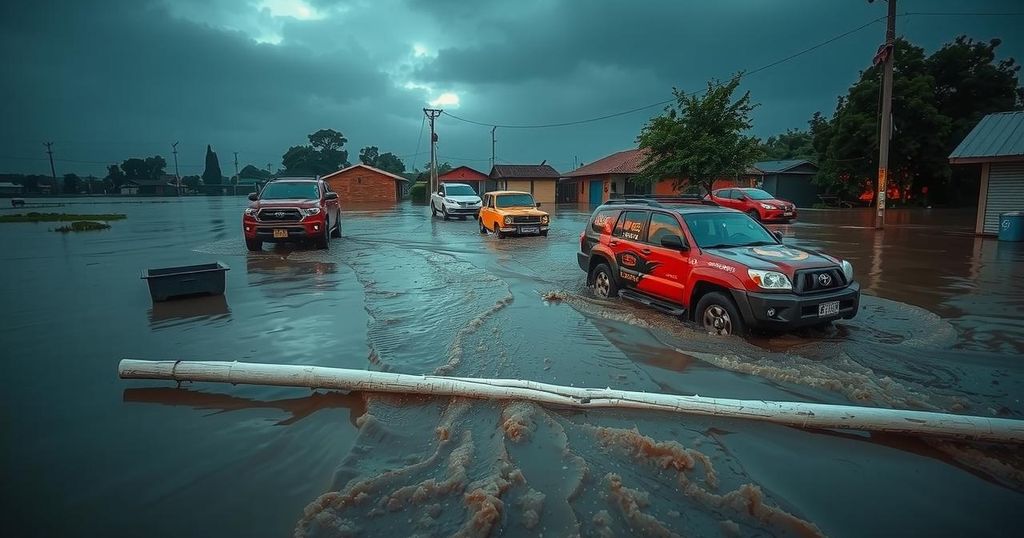Severe Flooding Intensifies Health Crisis in South Sudan: WHO
Severe flooding in South Sudan has displaced over 226,000 people and affected 42 counties, exacerbating an existing health crisis highlighted by rising malaria cases and suspected cholera outbreaks. The WHO is actively distributing emergency health resources and working with local authorities to address these challenges while advocating for sustainable health infrastructures to combat climate change impacts.
Severe flooding has struck South Sudan, causing unprecedented devastation across multiple regions, with over 226,000 individuals displaced and essential infrastructure submerged. According to United Nations data, 42 out of the 78 counties in South Sudan have been impacted, leading to the inundation of 58 healthcare facilities and rendering nearly 90 others inaccessible. The situation is compounded by the cutting off of 15 primary roads critical for access to the capital city, Juba, where advanced health services are available. As of October 4, 2024, approximately 890,000 individuals in flood-affected areas are reported to have suffered adverse effects. The nation typically experiences heavy rains between April and November, which often result in flooding. However, climate change has intensifed these events, overwhelming communities and prompting permanent displacement in certain instances. Moreover, the World Health Organization (WHO) reports that the flooding has deteriorated an already dire humanitarian landscape, with nearly 800,000 refugees and returnees fleeing conflict in Sudan. Recent health concerns have arisen, including suspected cholera cases in Renk County and a surge in malaria cases, with over 120,000 reported by the end of September. “People are in a heightened state of vulnerability due to multiple shocks. WHO is committed to work with the Ministry of Health and our partners to ensure that they have access to essential health services continue while also prioritizing the response to growing humanitarian and health needs,” stated Dr. Humphrey Karamagi, the WHO Representative in South Sudan. In response to the emergency, WHO has distributed approximately 88 metric tonnes of emergency health supplies to critical areas such as Renk, Bentiu, Malakal, and Bor counties, potentially serving over 870,000 individuals. These kits contain vital medical supplies, including cholera treatment and investigation kits, malaria medications, and snakebite antivenoms. Furthermore, WHO has mobilized nearly 1300 malaria kits domestically and prepositioned diagnostic tools to combat cholera. The organization is collaborating with the South Sudanese Ministry of Health to amplify its response during this complex health crisis, focusing on monitoring the public health impacts of the floods, especially concerning vector-borne and water-borne diseases. Additionally, WHO has emphasized the necessity of resilient health systems capable of enduring climate shocks. To address this aspect, it is advocating for sustainable investments to fortify health infrastructure and protect the most vulnerable populations.
The recent flooding in South Sudan is a result of severe weather patterns intensified by climate change, leading to unprecedented levels of rainfall. These environmental factors are exacerbating existing vulnerabilities in an already struggling nation, which is coping with a humanitarian crisis fueled by conflict and displacement. South Sudan’s reliance on certain infrastructure for health services makes the flooding particularly detrimental, as access to healthcare is essential for managing public health outbreaks, such as cholera and malaria, which are on the rise in the wake of the floods.
The flooding in South Sudan has intensified an existing health crisis, leading to widespread displacement and impacting vital infrastructure and healthcare services. The WHO’s efforts to provide emergency health supplies and coordinate responses are crucial in addressing the needs of affected communities. Sustainable measures to combat the health impacts of climate change remain imperative for building resilience in the South Sudanese health system and protecting vulnerable populations from future crises.
Original Source: sudantribune.com




Post Comment